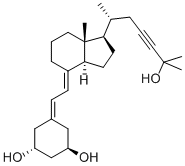VD/VDR
Vitamin D (VD) and its receptor, the Vitamin D Receptor (VDR), play essential roles in human health beyond their well-known functions in calcium and phosphorus metabolism. Vitamin D, primarily obtained through sunlight exposure and diet, is converted in the body to its active form, calcitriol, which then interacts with VDR. VDR is a nuclear hormone receptor found in various tissues, regulating the expression of numerous genes involved in immune function, cell growth, and inflammation. The VD/VDR pathway is critical for maintaining bone health and modulating immune responses. Dysfunction in this pathway is linked to a range of diseases, including osteoporosis, certain cancers, and autoimmune conditions, underscoring its importance as a target for therapeutic intervention.

